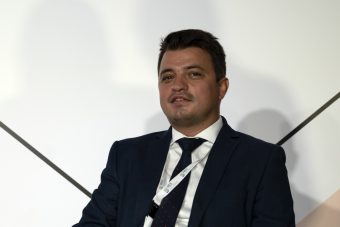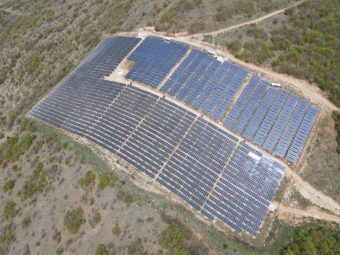
At the recently held conference of RES Serbia 2021, Viktor Andonov, Energy Advisor to the Macedonian Prime Minister Zoran Zaev, was one of the most notable guests. According to him, such an impression is the result of the hard work of the Government of the Republic of North Macedonia and all institutions related to the energy sector since they have taken serious steps forward and have a lot to say on energy and energy transition. We talked with Viktor Andonov about the reforms in the energy sector of the Republic of North Macedonia that followed the adoption of the new Energy Law, about projects in the field of renewable energy sources that are currently being implemented in this neighboring country. We also asked him how he assesses Serbia’s energy transition.
EP: How important is regional cooperation, and do you plan to implement some projects involving the countries of the former Yugoslavia?
Viktor Andonov: Regional cooperation is essential because it contributes to maintaining energy supply security in our region. Energy knows no boundaries. It is very optimistic that this cooperation has been functioning well for years, especially among the transmission system operators who communicate and cooperate on a daily basis to maintain the stability and reliability of our transmission systems. We should mention the cooperation in establishing the control block to ensure system services and functioning of the transmission system, as well as for security in supply at the lowest price among the operators of Serbia, North Macedonia, and Montenegro.
It is an example of the path to be followed regarding future cooperation, especially considering the plans for larger investments in renewable energy sources and the method of their balancing. Furthermore, we have the joint initiative within the framework of Open Balkan to build a joint large photovoltaic power plant; this could be a great project that will reinforce the cooperation. We are currently conducting an appropriate analysis in North Macedonia to define the best potential locations suitable for the realization of such an investment. If I were to sum up regional cooperation in just a few words, I would say that it is not only important but necessary because our energy markets are small, dependent on import. We must cooperate for the better life of all citizens in the region.
In focus:
EP: Reforms in North Macedonia started with the new Energy Law in 2018. What changes has the Law brought in the field of renewable energy sources?
Viktor Andonov: The new Energy Law, which included the third package of the EU Directives referring to the internalenergy market, as well as the adoption of numerous bylaws required for full implementation of the Law, were the reason for the Energy Community Secretariat to grant us with the status of champion in implementing energy reforms in one of its most recent reports on the implementation of the acquis in the national legislation. While implementing the reforms, we focused on changing the concept to support the construction of new photovoltaic power plants, which is quite normal if we take into consideration the fact that North Macedonia is a country with plenty of sunny days and that it has adequate solar radiation, much larger compared to some of the Western European countries. It is a pity that this potential was not sufficiently exploited in the past.
Unfortunately, we did not use one of the main natural resources at our disposal as much as we could. The previous concept of support in the form of feed-in tariffs had several shortcomings, and most notably, they were granted following the principle of first come – first served. Furthermore, all costs of purchasing electricity were borne by the end-users. The new, current concept based on the premium tariffs defines a clear and transparent procedure for awarding the premium tariffs through an electronic auction and negative bidding, which had excellent results in the first two auctions conducted in 2019. Using only these pilot projects to build photovoltaic power plants, following the premium principle, we managed to increase the photovoltaic capacity 3.5 times. Unfortunately, this resulted in only 18 MW; however, with the calls from 2019, projects for 60 MW of installed capacity are underway.
EP: Which renewable energy projects are currently being implemented in North Macedonia, and which is the most significant?

Viktor Andonov: We focus on renewable energy sources. They are necessary to complete the fair transition process, which has already started, which means the transition from conventional to renewable energy sources; we focus on getting energy from natural gas. One of the first significant projects is constructing the first photovoltaic power plant in the old coal mine at the Oslomej thermal power plant. This was done by the national company ESM for a capacity of 10 MW.
This power plant will be put in operation at the end of October. Thanks to this first project, the EBRD has provided a grant to prepare technical documentation to construct another 10 MW photovoltaic power plant Oslomej and an additional 20 MW in REK Bitola. In 2020, with the support of the EBRD, a transparent tender procedure was conducted to construct two photovoltaic power plants on the remaining site of the old coal mine in Oslomej. A photovoltaic power plant will completely replace the capacity of the 120 MW thermal power plant, i.e. two 10 MW power plants owned by ESM and two private investments of 50 MW made by the Turkish company FORTIS ENERJI and Solarpro Holding from Bulgaria. This project is the first of its kind in the Balkans and this part of Europe and shows the Government’s commitment to the goals of the Green Deal – zero emissions by 2050. Last month, the London-based EFT Group was granted investor status to build an 80 MW photovoltaic power plant.
We plan to construct one of the largest photovoltaic power plants in the Balkans, with a capacity of 350 MW, on the site of the previously planned cargo airport in Štip. It can be a very attractive investment for all interested companies. The construction terms are excellent, the solar radiation is good, and the connection to the transmission system is quite accessible and easy to perform. The most important project for the Republic of North Macedonia and in the region is the Čebren hydropower plant (installed capacity from 330 to 450 MW), which is planned to be built on the largest tributary of the Vardar, the Crna Reka. The realization of this project is essential for the successful energy transition of Northern Macedonia, bearing in mind that this project should ensure the balancing of our electricity system. A tender procedure is currently being conducted following the Law on Concessions and Public-Private Partnerships.
Interviewed by: Nevena Đukić



